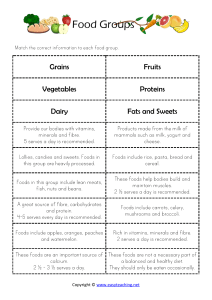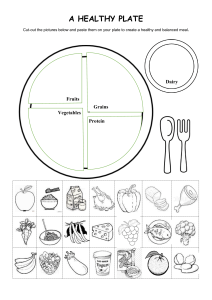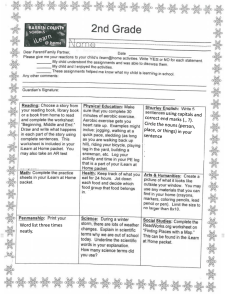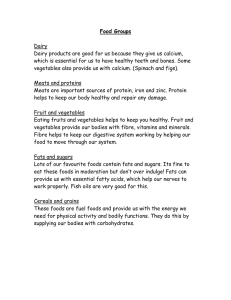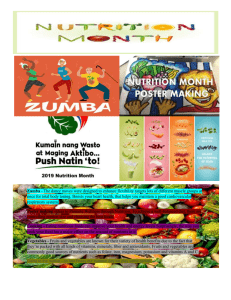Basic Nutrients: Types, Sources, and Benefits
advertisement
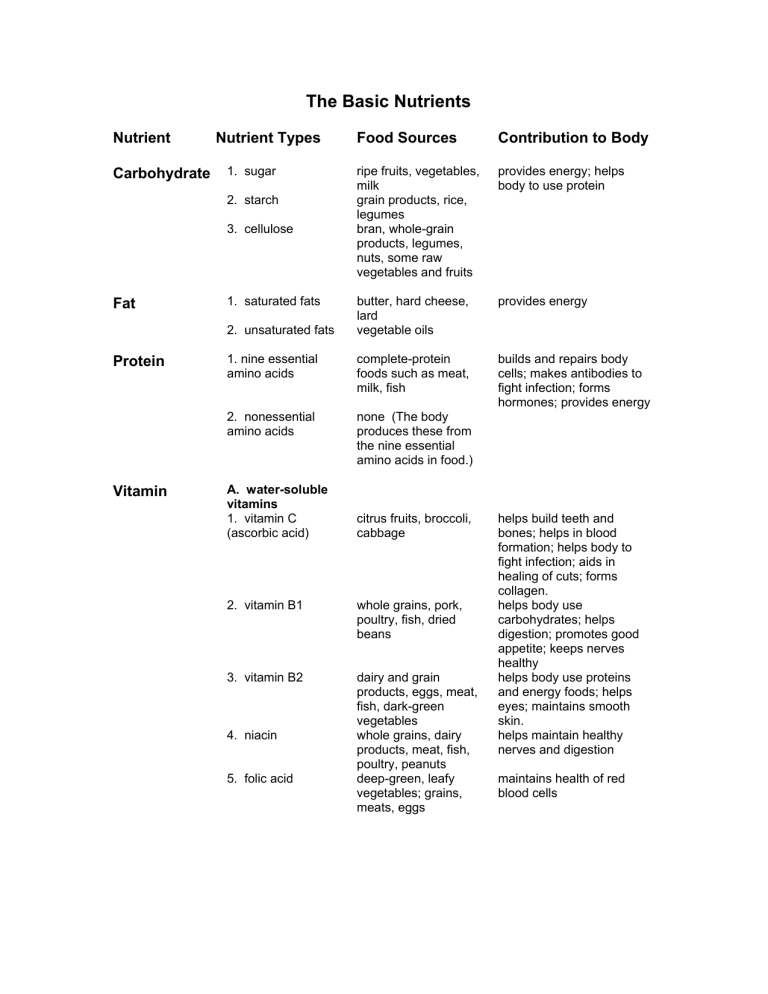
The Basic Nutrients Nutrient Carbohydrate Nutrient Types Food Sources Contribution to Body ripe fruits, vegetables, milk grain products, rice, legumes bran, whole-grain products, legumes, nuts, some raw vegetables and fruits provides energy; helps body to use protein butter, hard cheese, lard vegetable oils provides energy 1. nine essential amino acids complete-protein foods such as meat, milk, fish builds and repairs body cells; makes antibodies to fight infection; forms hormones; provides energy 2. nonessential amino acids none (The body produces these from the nine essential amino acids in food.) 1. sugar 2. starch 3. cellulose Fat 1. saturated fats 2. unsaturated fats Protein Vitamin A. water-soluble vitamins 1. vitamin C (ascorbic acid) citrus fruits, broccoli, cabbage 2. vitamin B1 whole grains, pork, poultry, fish, dried beans 3. vitamin B2 dairy and grain products, eggs, meat, fish, dark-green vegetables whole grains, dairy products, meat, fish, poultry, peanuts deep-green, leafy vegetables; grains, meats, eggs 4. niacin 5. folic acid helps build teeth and bones; helps in blood formation; helps body to fight infection; aids in healing of cuts; forms collagen. helps body use carbohydrates; helps digestion; promotes good appetite; keeps nerves healthy helps body use proteins and energy foods; helps eyes; maintains smooth skin. helps maintain healthy nerves and digestion maintains health of red blood cells Nutrient Nutrient Types B. fat-soluble vitamins 1. vitamin A carrots, pumpkins, broccoli, dairy products, liver, eggs helps growth and health of bones, teeth, skin, hair; maintains health of eyes; fights infection helps build strong bones and teeth helps body use energy foods; protects body from too much oxygen aids in blood clotting fortified milk 3. vitamin E oils, whole grains, eggs, milk, liver, green leafy vegetables dark-green, leafy vegetables; cabbage, cauliflower 1. calcium dairy products, broccoli, turnip and mustard greens 2. phosphorus dairy products, whole grains, meats, dried beans, peas 3. magnesium dairy products, eggs, organ meats, whole grains, nuts, leafy vegetables 4. sodium table salt, processed foods, pickled foods, cured foods table salt citrus fruits, bananas, dried fruits, fish meats organ meats, eggs, meat, dried fruits and legumes, whole grains, dark leafy greens saltwater fish, iodized table salt seafood, meat, eggs, dairy products, whole grains 5. chlorine 6. potassium 7. iron 8. iodine 9. zinc Water Contribution to Body 2. vitamin D 4. vitamin K Mineral Foods Sources drinking water, soups, sauces, beverages, fruits, vegetables helps to build and maintain strength of bones and teeth; helps blood clotting; ids heart and nervous system helps to build and maintain strength of bones and teeth; helps body to produce energy and to use other nutrients helps muscles and nervous system; aids enzymes; aids use of carbohydrates and proteins; forms skeleton, soft tissues, and blood regulates body fluids; helps muscles, including heart; helps nerves helps nutrients to enter cells and eliminate wastes with protein, makes hemoglobin; helps cells to use oxygen received from blood enables thyroid gland to regulate metabolism helps body to use carbohydrates, fats and proteins; helps in healing wounds; protects against disease; aids growth and reproduction makes up part of blood and digestive juices; regulates body temperature
